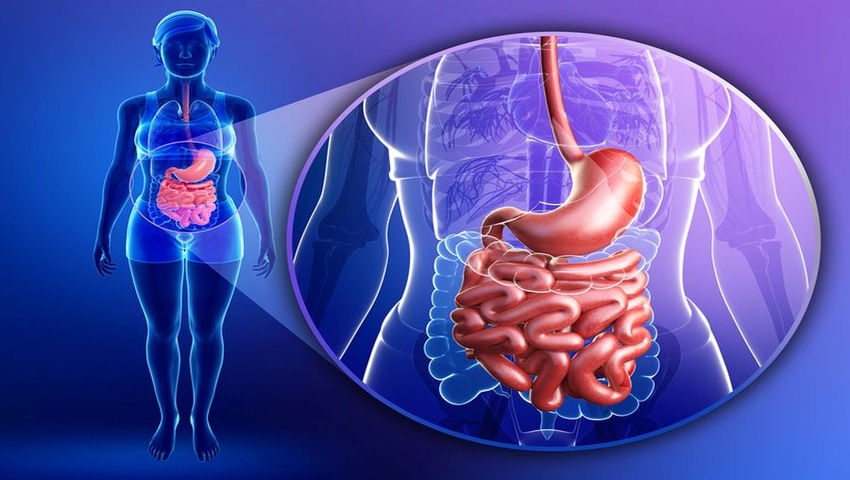By lowering sugar intake, increasing protein intake and supplementing with key strains of bacillus endospores and selective fiber, the human body may become reprogrammed to better manage weight and reap other health benefits.

They’re out there: the people who can eat virtually anything and not gain weight. Some people can get away with a lot more deviations from a healthy eating plan while staying lean or at least not putting on unwanted weight as quickly as most others do. Such good fortunes are typically credited to the person’s having a “high metabolism." This implies they simply burn more calories just walking around, sitting, sleeping and doing daily activities. This is actually not true, and recent scientific discoveries on the microbiome (the collection of organisms that live in and on us, primarily in the digestive tract) have shed some light on this topic.
As it turns out, the bacteria in the gut and the type of species in the digestive tract play a critical role in determining whether a person will be lean or obese. They play a paramount role in the risk for developing type 2 diabetes and how many unhealthy snacks or meals a person can get away with before the pounds pack on.
The type of bacteria in the gut controls the amount of calories the body extracts from the food that is consumed, what food is craved and what that food is converted to in the digestion process. These effects are realized by turning on crucial genes in the digestive tract that control the metabolic rate. Each individual is either programmed to gain weight easily and retain weight all too well or to be lean; the good news is that this programming can be changed by using the right probiotic bacteria and feeding those good bacteria with the right types of nutrients.
From the microbial side, there are two important things to pay attention to. The first one is the ratio of bacteroidetes to firmicutes (categories/phylum of bacteria) in the gut. Lean people all over the world and among many different cultures studied tend to have a slightly higher ratio of bacteroidetes to firmicutes. Having higher firmicutes seems to be directly associated with obesity, metabolic syndrome, diabetes and inflammation. There are a couple of simple things one can do to help alter the ratio of these two phyla of bacteria and reach the desired balance to keep the body lean and healthy.
First, bacteroidetes love fiber. However, fiber can also feed some bad bacteria in the digestive tract, so it is important to be selective in the source of fiber. Xylooligosaccharides have been shown in studies to specifically support the growth of the Bifidobacterium, which is a genus of bacteria that falls in the family of microbes associated with a lean body and healthy metabolism.
Next, realize firmicutes love sugar and simple carbohydrates. Processed simple carbohydrates and sugars feed firmicutes and thus lead to weight gain and metabolic syndrome. Eliminating sugar and processed carbs can be supported by bacillus spore-based bacteria. They have the capability to suppress the growth of negative bacteria that fall under the firmicutes phylum, such as clostridia.
By lowering sugar intake, increasing protein intake and supplementing with key strains of bacillus endospores and selective fiber (i.e., XOS), the body may become reprogrammed (through modification of key genetic activation) to favor fat burning, reducing fat accumulation and increasing energy metabolism, caloric burn, thermogenesis, satiety and insulin sensitivity.
This is where permanent and powerful weight loss and metabolic health comes from. Weight can be lost by simply taking in fewer calories than expended, and there are dozens upon dozens of weight loss products out there that help with weight reduction in the short term. However, selective use of the correct prebiotics and probiotics can further change the body to become a fat-burning machine.
Looking for more on weight loss ingredients and how to evaluate the science and claims? Join us for the Strategies for Successfully Navigating the Weight Management Market workshop on Wednesday, Oct. 5, at SupplySide West 2016.
Mark Thurston is president of AIDP Inc. He most recently served as vice president of global business development at Innophos Inc. Prior to Innophos, he was vice president and general manager of Rhodia Food Ingredients North America, and also served in various sales and business management capacities for Rhodia in France and the United Kingdom.
Kiran Krishnan is the acting chief scientific officer at Physician’s Exclusive LLC and Microbiome Labs, and is a co-founder and partner in Nu Science Trading LLC. He is a research microbiologist and has been involved in the dietary supplement and nutrition market for the past 16 years. He comes from a strict research background having spent several years with hands-on R&D in the fields of molecular medicine and microbiology at the University of Iowa.
References
Gao Z et al. “Butyrate Improves Insulin Sensitivity and Increases Energy Expenditure in Mice." Diabetes. 2009;58(7):1509-1517. DOI:10.2337/db08-1637.
Kondo T et al. “Vinegar intake reduces body weight, body fat mass, and serum triglyceride levels in obese Japanese subjects." Biosci Biotechnol Biochem. 2009 Aug;73(8):1837-43.
Kondo T et al. “Acetic Acid Upregulates the Expression of Genes for Fatty Acid Oxidation Enzymes in Liver To Suppress Body Fat Accumulation." J Agri Food Chem. 2009;57(13):5982-5986.
Lin HV et al. “Butyrate and Propionate Protect against Diet-Induced Obesity and Regulate Gut Hormones via Free Fatty Acid Receptor 3-Independent Mechanisms." Brennan L, ed. PLoS ONE. 2012;7(4):e35240. DOI:10.1371/journal.pone.0035240.
Lin J, Handschin C, Spiegelman BM. “Metabolic control through the PGC-1 family of transcription coactivators." Cell Metab. 2005 Jun;1(6):361-70.
Yamashita H et al. “Improvement of obesity and glucose tolerance by acetate in Type 2 diabetic Otsuka Long-Evans Tokushima Fatty (OLETF) rats." Biosci Biotechnol Biochem. 2007 May;71(5):1236-43.
About the Author(s)
You May Also Like




.png?width=800&auto=webp&quality=80&disable=upscale)